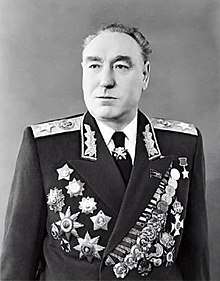Sergey Biryuzov
Sergey Semyonovich Biryuzov (Russian: Серге́й Семёнович Бирюзо́в; 21 August 1904 – 19 October 1964) was a Marshal of the Soviet Union and Chief of the General Staff.
Sergey Semyonovich Biryuzov | |
|---|---|
 | |
| Born | 21 August 1904 Skopin, Russian Empire |
| Died | 19 October 1964 (aged 60) near Belgrade, Yugoslavia |
| Buried | |
| Allegiance | |
| Service/ | Red Army |
| Years of service | 1922–1964 |
| Rank | Marshal of the Soviet Union (1955-1964) |
| Commands held | 37th Army Soviet Air Defence Forces Strategic Missile Troops |
| Battles/wars | World War II |
| Awards | Hero of the Soviet Union Order of Lenin (5) People's Hero of Yugoslavia Order of the Red Banner (3) Order of Suvorov Order of Kutuzov (2) Order of Bogdan Khmelnitsky |
Early life
Biryuzov was born in Skopin, in the Ryazan Governorate of the Russian Empire, in a working-class family of Russian[1] ethnicity. A member of the CPSU since 1926, he joined the Red Army in the 1920s and was steadily promoted to become the commander of a battalion before going to the Frunze Military Academy in 1934. He graduated in 1937, after which he became the Chief of Staff of a rifle division. In 1939 he was made Chief of Operations for the Kharkov Military district, a position he held until August 1939, after which he became the commanding officer of the 132nd Rifle Division.
Career
Biryuzov commanded this unit for the next three years, a rarity among Soviet generals, especially during World War II–as Soviet generals rarely held command positions for longer than a few months at most. Biryuzov’s division was a part of Southwestern and Bryansk Fronts. Biriuzov was a fine division commander, often leading his division personally into battle. Within the first year of Operation Barbarossa (June 1941), Biryuzov had been wounded five times, two times rather severely. In April 1942, he was made the Chief of Staff of the 48th Army, which was a part of Bryansk Front. He commanded this unit until November 1942, when he was made the Chief of Staff of the 2nd Guards Army. He was in this position until April 1943, helping to lead this powerful unit during Operation Saturn, when 2nd Guards Army helped crush the German 6th Army after the Germans had been surrounded during the Battle of Stalingrad.
In April 1943, he was made the Chief of Staff of the Southern Front, where he was a valuable aide to the Southern Front commander, Fyodor Tolbukhin. On October 20, 1943, Southern Front was renamed 4th Ukrainian Front. Biryuzov remained the Chief of Staff until May 1944 when he was transferred to 3rd Ukrainian Front, along with Tolbukhin. In October 1944, Biryuzov was transferred to command the 37th Army, which was a part of 3rd Ukrainian Front. He held this position through the end of the war, until May 1945. In these command positions, Biriuzov helped plan and carry out the expulsion of all German forces from the Ukraine, and then helped plan and carry out the liberation of Bulgaria and Yugoslavia.
After these commands, Biryuzov was made the Head of the Soviet Military Mission in Bulgaria, a position he held until 1947. Between 1947 and 1953, he commanded the Primorskiy Military District. From 1947-55, Biryuzov held numerous command positions, but he didn’t remain in any position too long. On March 11, 1955, Biriuzov was given the rank of Marshal of the Soviet Union. Between April 1955 and April 1962, Biryuzov was the Commander in Chief of the Soviet Air Defense Forces. After this, he was made Commander in Chief of the Strategic Missile Force, and in 1963, he was made the Chief of the General Staff.
Death
On October 19, 1964, Biryuzov and 32 others were killed when their Ilyushin Il-18 crashed against mount Avala near Belgrade.[2] The urn containing his ashes is buried in the Kremlin.[3]
Awards[4]
- "Gold Star" Hero of the Soviet Union (no 10828; 1 February 1958)
- People's Hero of Yugoslavia (1964)
- Five Orders of Lenin (27 March 1942, 6 November 1947, 20 August 1954, 1 February 1958, 20 August 1964)
- Three Orders of the Red Banner (13 September 1944, 3 November 1944, 20 April 1953)
- Order of Suvorov, 1st class (16 May 1944) and 2nd class (31 March 1943)
- Order of Kutuzov, 1st class (17 September 1943)
- Order of Bogdan Khmelnitsky, 1st class (19 March 1944)
Soviet medals and foreign orders
- Medal "For the Defence of Stalingrad"
- Jubilee Medal "30 Years of the Soviet Army and Navy"
- Medal "For the Victory over Germany in the Great Patriotic War 1941–1945"
- Medal "For the Liberation of Belgrade"
- Jubilee Medal "40 Years of the Armed Forces of the USSR"
- National Hero of Yugoslavia (October 1964, posthumously)
Notes
| Wikiquote has quotations related to: Sergey Biryuzov |
External links
| Military offices | ||
|---|---|---|
| Preceded by Matvei Zakharov |
Chief of the General Staff of the Armed Forces of the Soviet Union March 1963 – November 1964 |
Succeeded by Matvei Zakharov |